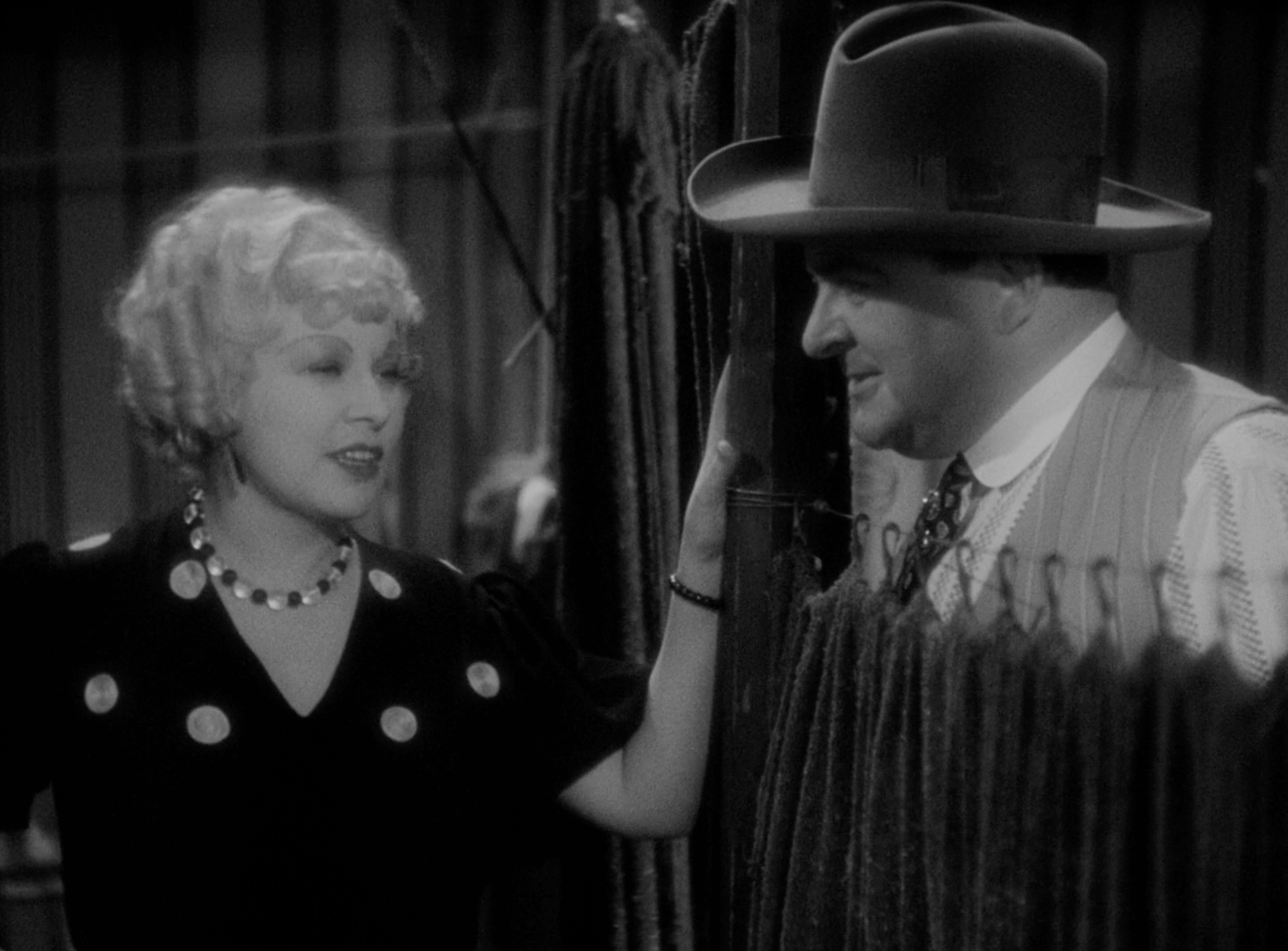
The Film Foundation Restoration Screening Room Resource Guide for
I'M NO ANGEL (dir. Wesley Ruggles, 1933)
Presented in The Film Foundation Restoration Screening Room in December 2022
in partnership with Universal Pictures.
Table of Contents
2) Special Features
-May West's New York Photo Essay
3) EXPLORE Page Materials
-The Film Foundation on Letterboxd
5) Live Screening Commentary Script
From the opening dance number where she vamps seductively behind a shimmering scarf, to the climactic courtroom scene where her wit captivates both judge and jury, I’M NO ANGEL is quintessential Mae West - sexy, smart, and thoroughly beguiling. As Tira, a circus performer, she sings and dances, purring like the lions she tames. Her talent with the big cats leads Tira to New York high society, where she’s wooed by wealthy men, including co-star Cary Grant. Young, handsome and impeccably elegant, even he is no match for her on-screen charisma. With memorable lines like, “When I’m good, I’m very good – but when I’m bad, I’m better,” I’M NO ANGEL makes it abundantly clear why West remains one of Hollywood’s most inimitable legends.
The digital restoration of I’M NO ANGEL was completed using a 35mm nitrate print as the primary picture source and the 35mm composite fine grain for select inserts in reels 1-4. The primary audio source was a 1933 optical track.
I’M NO ANGEL was restored in 4K by NBCUniversal Content Management at NBCUniversal StudioPost in collaboration with The Film Foundation. Special thanks to Martin Scorsese and Steven Spielberg for their consultation and guidance on the restoration of this film.
May West's New York Photo Essay

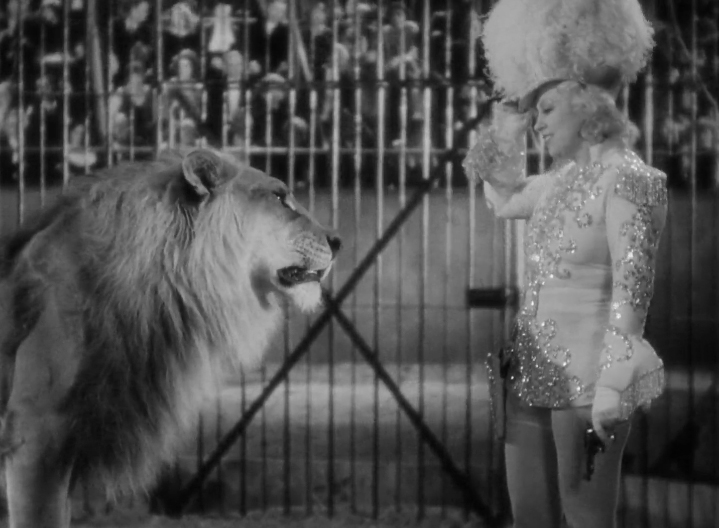
Mae West and Lion in I'M NO ANGEL
Mae West speaks with Dick Cavett on a special episode of The Dick Cavett Show.
Mae West speaking at UCLA 5/12/1971 via the archives of the UCLA Communications Studies Dept.
Mae West's Favorite Beauty Products from Laura Jane Atelier's YouTube Channel.
Mae West Made this "Insane" Film at Age 87, a clip via American Masters.
Cary Grant receiving an Honorary Oscar® from the Oscars Youtube Channel.
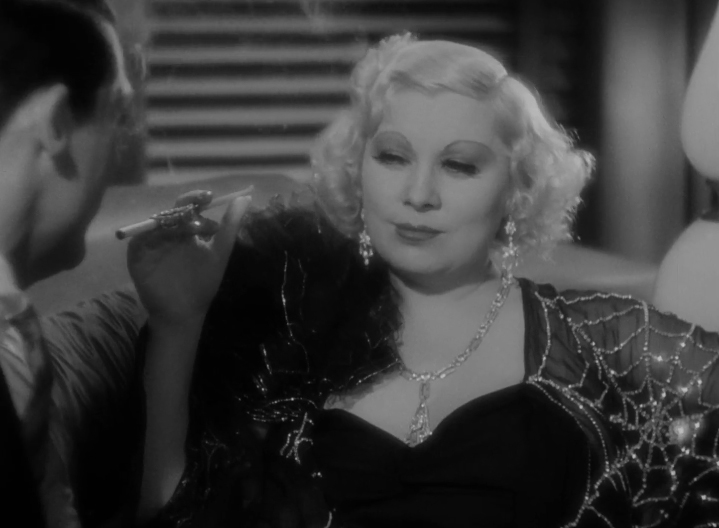
Mae West in I'M NO ANGEL
Movie Icons: Mae West, Taschen, 2008
Mae West: An Interview & Biography, Clive Hirschhorn, Grand Cyrus Press, 2009
Three Plays by Mae West: Sex, The Drag and Pleasure Man, ed. Lillian Schlissel, 1997
Guilty Pleasures: Feminist Camp from Mae West to Madonna, Pamela Robertson, Duke University Press, 1996
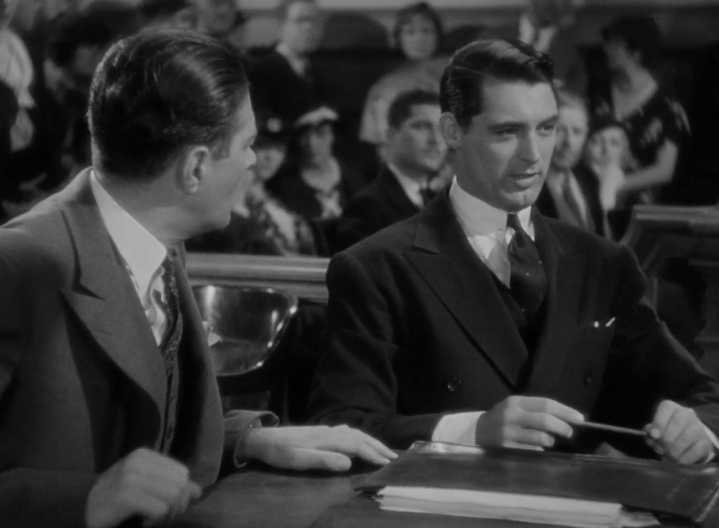
Cary Grant in I'M NO ANGEL
"The Self-Created Immortality of Mae West" via The Criterion Collection's Current
"Remembering Mae West," November 23, 1980, via RogerEbert.com
Great interviews of the 20th century: Charlotte Chandler's interview w/Mae West via The Guardian
"Mae West: Pleasure Woman" via Bright Lights Film Journal
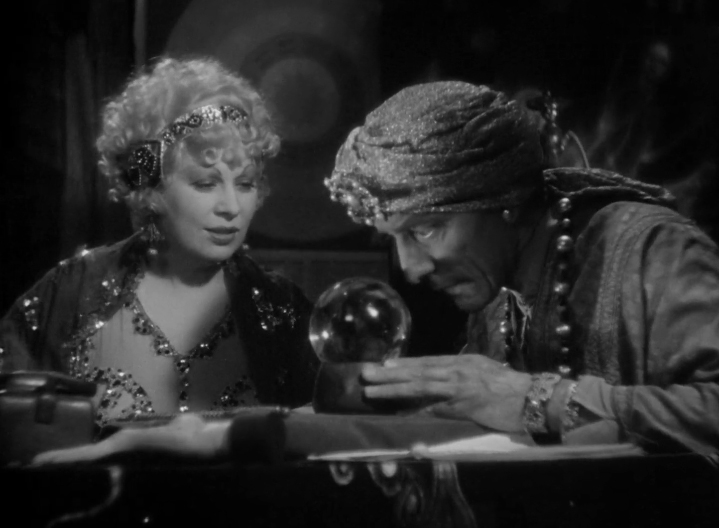
Mae West in I'M NO ANGEL
The Film Foundation on Letterboxd
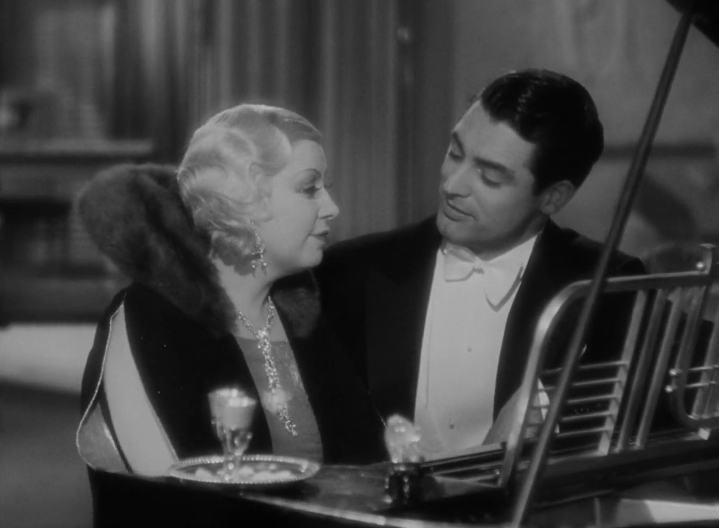
Cave girl
By Mae West, age 15
I got my smile from the sunshine.
I got my tears from the rain.
I learned to dance when I saw a tiger prance,
And a peacock taught me to be vain.
A little owl in a tree so high,
He taught me how to wink my eye.
I learned to bill and coo from a turtledove.
And a grizzly bear taught me how to hug.
But the guy that lived two caves from me,
He taught me how to love.
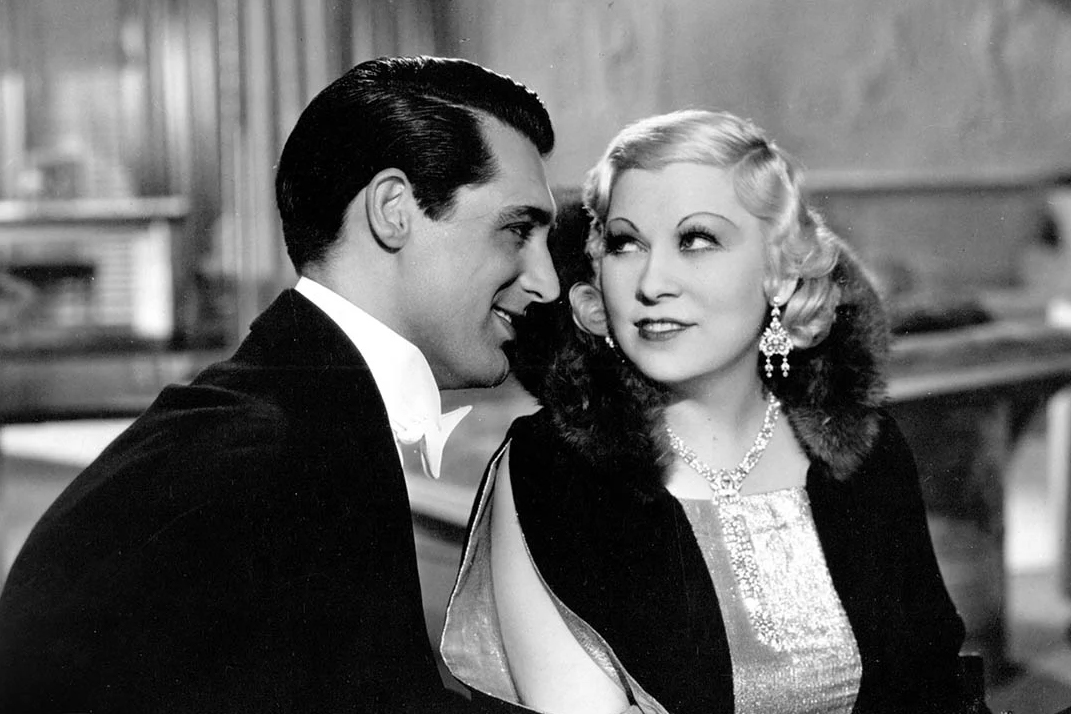
I’M NO ANGEL - Live Screening Commentary Script
12/12/22
Welcome to The Film Foundation Restoration Screening Room! Tonight we’re screening I’M NO ANGEL (1933, d. Wesley Ruggles).
You can stay with us here in the chat to learn more about the film as you watch or you can view the film full screen on-demand at 7pm.
In this chat mode the screening is live and picture controls (rewind/fast forward/pause) will not be available. If you miss anything or need to take a break, that functionality is available when watching on-demand.
Thanks for being here and we hope you enjoy our live commentary. We also encourage you to share your thoughts on the film as we go, making this a communal virtual viewing experience!
00:00:00 - 00:15:00
While NRA now refers to the National Rifle Association, in 1933 it had quite a different meaning and stood for the National Recovery Administration.
The National Industrial Recovery Act (NIRA) was enacted by Congress in June 1933 and was one of the measures by which President Franklin D. Roosevelt sought to assist the nation's economic recovery during the Great Depression. On June 16, 1933, this act established the National Recovery Administration, which supervised fair trade codes and guaranteed laborers a right to collective bargaining.
1933 was also a significant cinematic year because it was the last year movies were made before the Hays Code was enacted in 1934. The Hays Code prohibited profanity, suggestive nudity, graphic or realistic violence, sexual persuasions and rape on screen. The Code would drastically limit what Mae West could say and do in her films, forever changing her career. Though as critic Farran Smith Nehme recently said in our video interview,
“while she's [Mae West] famous for the sexual content that she managed to get on screen, she's never really vulgar."
Watch our entire interview with Farran Smith Nehme, available on this page.
00:15:00 - 00:30:00
Before coming to Hollywood in 1932, Mae West was roaming the streets of New York City, making her name in wildly popular stage shows like “Sex” and “The Drag.” She was born in the Big Apple in 1893, though the exact location of her birth remains up for debate, with the Brooklyn neighborhoods of both Greenpoint and Bushwick laying claim to the famous dame.
To learn more about West’s history in New York City go to the “Mae West’s New York” section on this page.
00:30:00 - 00:45:00
Often in Classic Hollywood films, actresses would put a stocking in front of the camera in order to diffuse the light so they would glow. According to Steven Spielberg, Mae West was very particular about the kind of diffusion used on her shots and she preferred that French stockings were used.
This anecdote was told to us by Cassandra Moore, the director of Content Mastering, Restoration, Preservation, and Archives for NBC/Universal, the talented folks behind this restoration. Be sure to watch our interview with Cassandra, available on this page, to learn more about the work behind the restoration.
00:45:00 - 01:00:00
Mae West first saw Cary Grant in 1932 when he was on set, working with Sylvia Sidney (and Wesley Ruggles brother Charles!) in MADAME BUTTERFLY. West inquired as to who he was and then reportedly said, “If he can talk, I’ll take him.” The two then made 1933’s SHE DONE HIM WRONG before doing I’M NO ANGEL later that year. As Cary Grant himself once said,
“Everyone wants to be Cary Grant—even I want to be Cary Grant.”
Director Wesley Ruggles might not be a household name these days but he had his hand & face (he was also an actor!) in many great films in the 1930s. In 1946, he was hired to direct LONDON TOWN, British cinema's first attempt at a Technicolor musical. Sadly, it ended up being one of the biggest critical and commercial failures in the country's film history, ending Ruggles’s career. To learn more about Ruggles’s career, visit the link below:
https://letterboxd.com/tff/list/the-career-of-wesley-ruggles/
Ruggles first big hit was 1931’s CIMARRON, which is based on an Edna Ferber novel. Next month’s Restoration Screening Room film—George Steven’s GIANT—is also based on a Ferber novel! We hope to see you in January for that screening.
01:00:00 - 01:15:00
SHE DONE HIM WRONG was Mae West’s first film in Hollywood and it was such a huge hit that the film was actually credited with saving Paramount from bankruptcy. It also afforded Mae the chance to make whatever movie she wanted next. As it turned out, her childhood dream was to be a lion tamer and voila, I’M NO ANGEL was born!
01:15:00 - 01:30:00
While everyone remembers Mae West for her on-screen work, it’s important to note that she wrote most of what she performed during her career, starting with the plays she did on stage and then later, when she adapted those plays to the big screen and novel form. For I’M NO ANGEL, she wrote the story, dialogue, and screenplay.
Mae wrote for most of her life, starting with poetry in her teenage years and a series of books written throughout her later life including “The Wit and Wisdom of Mae West,” “Goodness Had Nothing to Do With It,” “Mae West on Sex, Health and ESP,” and “Pleasure Man.”
Mae West’s last film, made in 1977 when she was 87 years old, was called SEXTETTE. It was based on her own play “Sextet” and is about a glamorous silver screen sex symbol who is asked to solve an international political dispute on her wedding day to husband #6.
The film is a who’s who of famous men including: Timothy Dalton, Ringo Starr, George Hamilton, Tony Curtis, Alice Cooper, Dom DeLuise, Keith Moon, Regis Philbin, George Raft, and Keith Allison.
Be sure to watch the American Masters excerpt “Mae West Made this "Insane" Film at Age 87,” all about SEXTETTE, available via the link below:
https://www.youtube.com/watch?v=UwW38OgAVb0
01:30:00 - end
Thank you so much for joining us!
I’M NO ANGEL was restored in 4K by NBCUniversal Content Management at NBCUniversal StudioPost in collaboration with The Film Foundation. Special thanks to Martin Scorsese and Steven Spielberg for their consultation and guidance on the restoration of this film.
The digital restoration was completed using a 35mm nitrate print as the primary picture source and the 35mm composite fine grain for select inserts in reels 1-4. The primary audio source was a 1933 optical track.
Please make sure to check out the “Explore I’M NO ANGEL” section on our I’M NO ANGEL landing page for more resources connected to the film and to watch the supplemental videos that are posted on the site.
We look forward to seeing you next month on Monday, January 9th for George Stevens’s GIANT, starring Elizabeth Taylor, Rock Hudson, and James Dean.
